As search engine optimization evolves, the trends for 2024 are exciting and important. SEO isn’t just about following an average guide anymore. The key updates focus on how to optimize websites efficiently and adapt to new algorithms. It’s clear that staying ahead in SEO means understanding the important changes and knowing how to cover all the bases.
Table of Contents
ToggleBased on personal experience, I’d advise focusing on user intent and always being ready to share opinions on the best strategies. If you do, you’ll absolutely love how your SEO improves throughout the year.
SEO: Key Updates and Strategies for 2024
As we look back on 2023, some important updates have emerged that will shape SEO strategies in 2024 and beyond. A quick recap shows the key changes and trends that are crucial for optimizing your SEO approach moving forward.
EEAT: The Rise of First-Hand Experience
The EEAT guideline has been updated in 2023, making first-hand experience a central factor in SEO. This shift prioritizes the importance of authentic, experience-based content over generic information, highlighting the need for quality insights that truly engage users.
Author Entities Take Center Stage
A major development in latest algorithm updates is the increased focus on author entities. Google is now more adept at recognizing and valuing the authors behind the content. This means that content linked to knowledgeable authors gains an extra layer of trust and credibility, which is influencing rankings like never before.
How Marketers Leverage AI Tools
In 2023, there was a surge in marketers using AI tools to save time. These valuable tools are streamlining SEO tasks, helping with ideation and generating content quickly and efficiently. This shift allows marketers to focus more on strategy while AI handles the heavy lifting.
AI Tools and Their Search Power
Despite the growing capabilities of AI tools in offering improved search functionalities, people’s behavior has not changed much. They still rely on search engines like Google for their queries. Most importantly, there has not been a decrease in organic traffic due to these AI tools.
1. The Role of AI in Content Creation
AI is shaking the world of content creation, presenting both an opportunity and a threat.
AI tools are good at generating generic content based on existing SERP data.
AI is flooding the internet with similar pieces of content.
Content creators must be cautious about relying solely on AI for their writing.
The real risk lies in filling a website with repetitive content, leading to a loss of value.
Companies like Jarvis have raised a hefty sum and hired freelance writers as their first move.
This shows a clear message: even the best AI technology acknowledges the irreplaceable value of human insights and creativity.
There is a rise in the demand for senior writers.
It’s essential for content creators to provide original and valuable material.
Maximizing AI for Scale
To boost your scale using AI, consider it a helpful assistant for writing tasks.
Use AI to summarize known information or turn lengthy paragraphs into concise bullet points.
This makes existing copy more effective while saving you time.
- AI can create top-level outlines that lay the foundation for your content.
- Focus on adding unique insights and depth for a human touch.
- AI can act as an editor by applying an established voice and tone to your draft.
- It helps to make your content shorter and clearer while maintaining essential details.
- Using specific prompts when drafting will lead to better results.
- Leverage these skills to efficiently create high-quality content while enhancing your overall writing process.
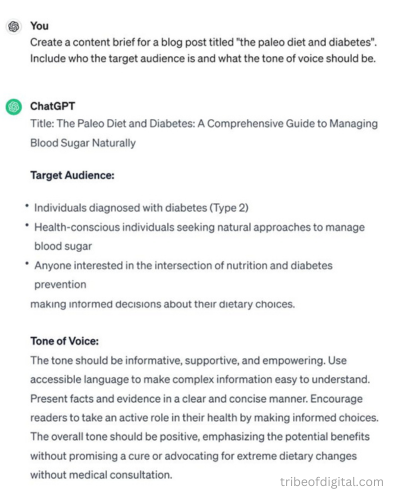
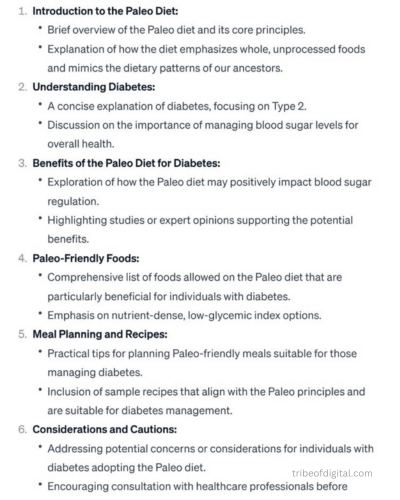
AI can be a powerful assistant to boost your scale in content creation. Use AI to summarize information, draft outlines, or even create tables and bullet points, but remember to apply your unique insights. While AI helps streamline writing, don’t let it overshadow your creativity; balance its capabilities with your expert touch for the best results.
Unused words: skills, act, established, voice, tone, existing, copy, shorter, lengthy, paragraph, data, top-level, process, foundation, details, flesh, depth, human, touch, provide, give, writers, subject, matter, experts, skeleton, build, content, using, ChatGPT, specific, prompts.
2. First-hand Experience Is the Differentiator of Quality Content that AI Couldn’t Write
In the world of content creation, first-hand experience stands out as the differentiator for quality that AI cannot replicate. Google emphasizes authenticity and depth in its EEAT guidelines introduced in December 2022.
This means content that offers real, lived experiences resonates more with users than generic information. For example, an article written by someone from a hedge fund can provide unique insights into alternative data, creating a deep dive that adds real value.
This type of content moves beyond a basic overview and showcases personal stories, making it more trustworthy.
Users today seek content that feels personal and relatable, whether on YouTube, TikTok, or Reddit. Unlike traditional search engines that may offer more impersonal results, content rich in real opinions and human touch fulfills specific queries better.
The challenge lies in publishing material that not only shares information but also reflects genuine experiences and interpretations, which is something AI cannot fully achieve. This approach encourages high-quality content that engages readers on a deeper level and sets it apart from auto-generated pieces.
3. The Importance of Author Entities
In SEO, the role of author entities has never been more critical. As we move into 2024, search engines are focusing on the authority and value that individual authors bring to their content. It’s essential to document your experiences and insights to stand out.
This means creating content that reflects your first-hand knowledge or interviewing an expert in your subject. When you provide unique perspectives, you not only build trust but also enhance the distribution of your content.
Many SMEs can share valuable insights that add depth to your topics. Instead of starting from scratch, think about how to double-down on your strengths as a writer.
The focus should be on delivering content that resonates with users, as this is the trend that leads to higher authority and improved SEO performance. By aligning your content creation process with these principles, you set a strong foundation for success in the evolving digital landscape.
How to Use Author Entities
- Using author entities is crucial for improving SEO in 2024.
Create author pages on your site that show:
- Background
- Areas of expertise
- Links to their published posts
- Helps Google and readers recognize the real authors behind the content.
Having the same authors publish on other sites can:
- Grow their footprint
- Enhance credibility
- Add SMEs or expert writers to the byline and encourage them to co-distribute content.
- This makes it obvious that humans are behind the writing.
- Use social media to promote successful guest posts from established authors.
- This encourages collaboration.
Example: Brian Dean, a biggest name in SEO and previous owner of Backlinko, can enhance the content with his insights.
Similarly, Branko Kral has contributed to several big marketing blogs.
Establishing strong author entities can be a key trend in SEO this year.
Following this practice improves your site’s visibility and trustworthiness.
4. SGE's Influence on User Search Behavior
The search generative experience (SGE) from Google is changing how users search online. While it helps users by providing quick answers to complex questions—like choosing between Bryce Canyon and Arches—it doesn’t mean that existing content will lose its value. Many users still want detailed human-written content to explore their experiences and gather recommendations. As this new AI-powered feature develops, it’s essential to adapt your SEO strategy, focusing on providing quality content that meets user needs while embracing the changes SGE brings.
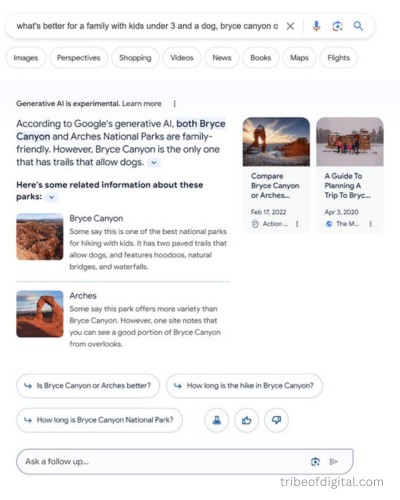
You might wonder if the search generative experience (SGE) will take away your website traffic. The answer is no. While SGE provides quick answers to user queries, it still points users to the best-ranking content for deeper insights.
People value trustworthy articles and will continue to explore full pieces for detailed information. When searching for things like product reviews or the best vacation spots, users prefer real experiences over simple AI snippets.
They want authentic information from those who have genuinely tried a product or visited a location.
Even though SGE may slightly change how we search, it won’t drastically impact your traffic. Focus on creating high-quality, legit content that offers real insights.
This is what keeps users coming back and helps your site rank better on Google. While SGE may seem like a major shift, it appears more as a response to evolving technology than a groundbreaking change. Google’s ongoing effort to adapt could even make it its own biggest competitor in the long run.
Optimizing for SGE: Key Strategies
To optimize for SGE in 2024, it’s important to keep the basics of SEO in mind. While many may freak out over the new strategy, there’s no need for a complete overhaul. Focus on creating reputable content that provides real value to your audience.
Ensure your content is engaging and informative. Incorporate relevant links to support your claims and improve your ranking on Google.
Remember the hype surrounding voice search? Many thought it would be a huge game-changer, but it didn’t really change how we approach text search.
Instead of being distracted by every new thing, keep your main focus on delivering quality content that stands out. By doing this, you can maintain a top spot on Google while adapting to the evolving landscape of search technology.
“If you rank on top positions, Google’s AI will scrape you and SGE will likely include your content in its snippet.”
5. Shifting Focus: Optimizing for User Signals
Today, SEOs are shifting their focus towards optimizing for user signals directly rather than just concentrating on traditional ranking factors. Google’s patents and the recent antitrust case reveal that their search algorithms heavily rely on how happy users are with the content they find.
They are figuring out ways to understand and analyze user sentiments and reactions to improve overall engagement and satisfaction. This is a significant change from simply relying on deep analysis of backlinks and text.
For instance, consider a glasses company that annoys customers on purpose to generate buzz and backlinks. While this strategy may have worked briefly, Google quickly penalized the site for negative signals.
This highlights the importance of prioritizing user experience over mere tactics to increase rankings. Now, understanding user behavior and their feelings about a brand is critical for maintaining a top spot in search results. Sites that adapt to these changes and prioritize genuine user satisfaction will likely see better relevance and usefulness in their content, leading to long-term success.

In the world of SEO, the importance of optimizing a page for user intent is becoming clearer. Today, signals like bounce rate play a key role in determining ranking success. As we look to the future, successful SEO strategies must focus on how well they cater to user needs and expectations, even going beyond traditional content approaches. It’s clear that understanding these signals is not just an option; it’s essential for staying relevant and achieving success in today’s digital landscape.
How to Optimize for User Signals
“Optimizing for user signals comes down to optimizing your page so that users spend time interacting with your page. Ideally, they’ll even want to share it further.”
- Focus on user engagement metrics: Track time on page, bounce rate, and clicks on buttons to understand user interaction.
- Align content with user intent: Provide quick answers that are easy to find, avoiding long text blocks.
- Incorporate visual elements: Use videos and infographics to enhance engagement.
- Encourage user interactions: Add comment sections, polls, and quizzes to foster a more engaging experience.
6. Search Intent Becoming More Critical for SEO
In 2024, the importance of matching search intent has grown significantly. Google has made this a key ranking factor, with a strong focus on getting it right. Their quality rating guidelines now emphasize how well content aligns with what users are actually searching for.
For example, if someone searches for the best running shoes, they expect a list of top options, not a product page pushing a specific pair of shoes. Missing this mark can lead to a higher bounce rate, signaling to Google’s algorithm that your page didn’t meet the intent.
When a searcher clicks a link and doesn’t find what they expect, they quickly leave and open another page that better satisfies their need. This is why matching keywords alone isn’t enough anymore. Google will now prioritize other pages that deliver on intent, making this approach essential for SEO success
Pages that effectively match search intent will continue to outperform others, helping websites stay competitive in the ever-changing landscape of the internet.
How to Align Content with Search Intent
When it comes to Optimizing your content, understanding search intent is essential. Start by identifying what your target audience is searching for and why.
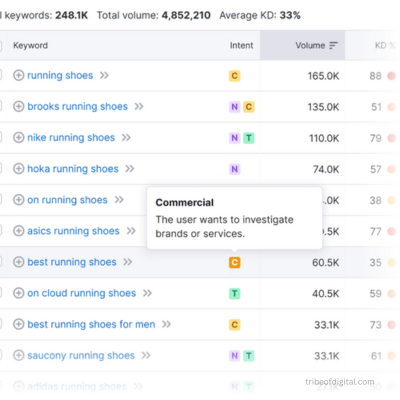
Tools like Semrush’s Keyword Magic Tool can help you find related keywords and understand the user’s purpose behind them. By analyzing the top SERP results, you can see what type of content ranks on the first page and what query it aims to answer.
Once you fully understand the intent, you can create content that not only satisfies the target audience but also resonates with them. This approach helps ensure that your content ranks well and delivers results that users are looking for.
7. UX Becomes More Important in SEO Success
In 2024, user experience (UX) remains a critical factor in SEO as it directly impacts Google’s algorithm and how websites are ranked.
Core web vitals, introduced in 2021, focus on key metrics like largest contentful paint (LCP), cumulative layout shift (CLS), and first input delay (FID), which assess a site’s speed, navigation, and overall performance.
As of March 2024, interaction to next paint (INP) replaces FID, adding a new layer to how Google evaluates a website. Ensuring your site’s elements—from ease of navigation to page load times—provide a positive experience will continue to be crucial in boosting ranking.
INP is similar to FID, but more advanced.
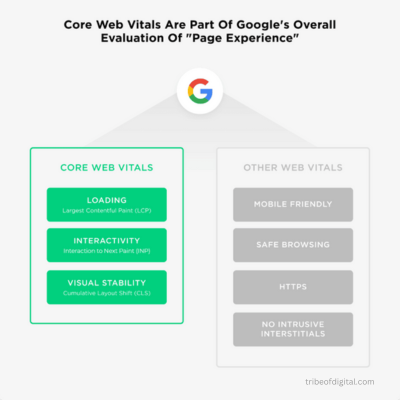
It considers all page interactions like:
- Clicking with a mouse
- Tapping on a device with a touchscreen
- Pressing a key on either a physical or onscreen keyboard
Meanwhile, FID only accounts for the first interaction.
Enhancing UX for Better SEO Results
- Optimizing your UX is about making your site easy and intuitive to navigate.
- Focus on improving your site’s speed.
- Limit unnecessary pop ups and be intentional with the ones you choose to keep.
- Structure your page clearly with prominent CTAs and align them with your monetization strategy.
- Ensure everything is contextually relevant, including linking to content that benefits the reader.
8. The Role of Topical Relevance and Quality Backlinks in Domain Authority
In 2024, Google places great importance on domain authority, which now heavily relies on topical relevance and genuine backlinks.
This means that your site should focus on specific subjects and provide authoritative content. For instance, if you’re a chef specializing in Italian cuisine, your website should deeply explore topics like traditional cooking techniques and regional recipes.
This approach shows Google that you are an expert in your field, helping you rank higher.
To build domain authority, you need to pursue relationship-based link building.
This involves getting backlinks from legit sources in your niche. For example, guest posts can be a great way to create valuable content that drives traffic and builds your authority. When you collaborate with other experts, you not only gain quality links but also share useful resources that benefit your readers.
By focusing on these strategies, your site can improve its ranking and stand out in the competitive world of search engines.
9. The Rise of AI and Social Networks in Search
In 2024, AI chats like ChatGPT and Bard are gaining attention as new options for finding information, leading some people to wonder if they are a real threat to search engines like Google.
“We don’t see AI in terms of a third app, like ChatGPT or a different type of large language model, changing how people search for things on Google. At least in 2024.”
While these AI tools are the fastest growing apps in history, they haven’t changed the number of users who google things regularly. Most people have become accustomed to this behavior, using the term “googling” as a part of their everyday lexicon.
Social media platforms like TikTok are also stepping in, especially among young users looking for recommendations on restaurants and vacation spots.
However, for more serious queries, like advice on financial matters, many still turn to Google for reliable, accurate information. This is because search engines offer depth and expert sources that social networks and AI cannot match when it comes to trustworthiness and detailed knowledge.
How to Adapt to Alternative Searches
- Adapting to alternative searches involves understanding how people search for information.
- Platforms like TikTok and YouTube are growing in importance.
- It’s essential to optimize your content to reach your audience effectively.
- Focus on enhancing captions and using explainer images that embed well in search results.
- Employ schema markup to help Google and other engines better recognize your content.
- Aligning your strategies with these trends improves your chances of being found in various searches.
- This approach ensures your content meets users’ evolving needs now and in the future.
10. Local Search Results Are Evolving
- Recognize the maturity of local search in the SEO landscape.
- Utilize targeted advertising to enhance business visibility in search results.
- Focus on effective review management:
- Encourage customers to leave feedback.
- Improve products and services based on that feedback.
- Prioritize ratings:
- Aim for a higher average rating to boost business ranking.
- Optimize your Google Business Profile:
- Select the right category.
- Provide a clear description.
- Include attractive photos.
- Implement schema markup to help search engines better understand and index your content.
- Ensure potential customers can easily find information about your business.
- Engage with emerging platforms like TikTok and Snapchat to connect with younger audiences, particularly Gen Z.
- Highlight local restaurants and experiences to attract a diverse customer base.
How Voice and Visual Search Have Matured
Voice and visual searches are now more maturing than ever before, changing how people find information. In the early days of Siri and Alexa, they were mostly for quick fact checks like asking for the capital of France or the Eiffel Tower’s height.
Now, many people use voice search to locate the nearest coffee shop or Italian restaurants, especially when they are occupied with cooking or driving.
They might ask, “How to make caesar dressing?” or say, “Navigate to the closest gas station.” Although some might think this is just a hype, voice and visual searches are pulling top results from Google and are becoming a standard tool for everyday business searches.
As these technologies continue to evolve, they will likely have a bigger impact on how we look for and interact with content online.
How to Optimize for Voice Search
So, the best strategy for search engines to include your content in voice search?
“Nail your SEO for Google’s traditional search. If you rank high there, you’re likely covered for voice search too.”
Visual Search
- Discounts
- Sales
- Cart
- Checkout
- Maps
- GPS
- Navigation
- Routes
- Traffic
- Attractions
- Monuments
- Feedback
- Recommendations
- Language
- Interpretation
- Ingredients
- Cooking methods
- Calories
- Macronutrients
How to Optimize for Visual Search
- Ensure your site is mobile-friendly as most searches occur on mobile devices.
- 9 out of 10 Google Lens results come from sites that passed Google’s mobile test.
- Use traditional techniques to optimize image filenames and alt text to boost rankings.
- Include around 1,600 words of text on the page along with images.
- Google tends to pull results from pages that have a quite significant amount of accompanying content.
The Future of SEO: Next 5 to 10 Years
In the next five to ten years, the evolution of SEO will likely remain steady rather than dramatic. Although there are innovations in tech like GenAI and machine learning, the core principles of SEO will not drastically change.
Users still prefer Google over other platforms like ChatGPT or Bard for searching, indicating that their behavior is slow to shift. This means SEO will continue to focus on delivering quality content that is engaging and accessible to the masses.
As search engines become smarter, the emphasis will be on refining how they identify good websites and content that meets user needs.
We are seeing higher adoption rates of AI tools and algorithms that help in content creation and data analysis.
While it may be unlikely for users to fully switch to new tools, the market will expand, allowing more opportunities for everyone. The key is to keep using first-hand experience and authoritative insights that help websites rank higher.
Overall, while subtle changes will continue to occur, the foundational principles of SEO, like providing quality, original content and a clean website architecture, will hold true in 2024 and beyond.
FAQ About Latest SEO Updates 2024
In March 2024, Google released a complex core update that involved multiple systems getting updated, leading to fluctuations in rankings. This update aims to reduce unhelpful content in Search by 40%, making SEO efforts even more crucial.
Backlinks are very important for SEO in 2024. The quality and quantity of links pointing to a website play a crucial role in determining its ranking on search engine results pages. More high-quality links will likely lead to better results and a higher position in search results.
To become an SEO expert in 2024:
- Start by mastering the fundamentals of SEO.
- Gain hands-on experience.
- Develop core skills to help you expand your knowledge.
- Consider consulting as an optional path.
- Build professional skills for achieving success in this field.
In the last 25 years, SEO has seen significant changes. What started as simple keyword matching tactics in the 1990s has turned into complex ranking systems powered by artificial intelligence. As best practices evolve, they now align with regular algorithm updates from search engines to improve user experience and results.
When you stop performing SEO on your website, your keywords can still maintain their position for about 4 to 7 months. However, this range can vary based on the quality of the SEO work done initially. If the efforts are good and not reversed, they will hold first place longer, but eventually, you may need to re-evaluate your strategy to stay ahead.
Conclusion
In summary, the latest updates in SEO for 2024 highlight the importance of quality efforts in maintaining your website’s keywords. While good SEO can keep your rankings stable for 4 to 7 months, ongoing optimization is essential to adapt to changes in search engine algorithms. Staying proactive in your SEO strategy will help ensure your website remains visible and competitive in an ever-evolving digital landscape.
